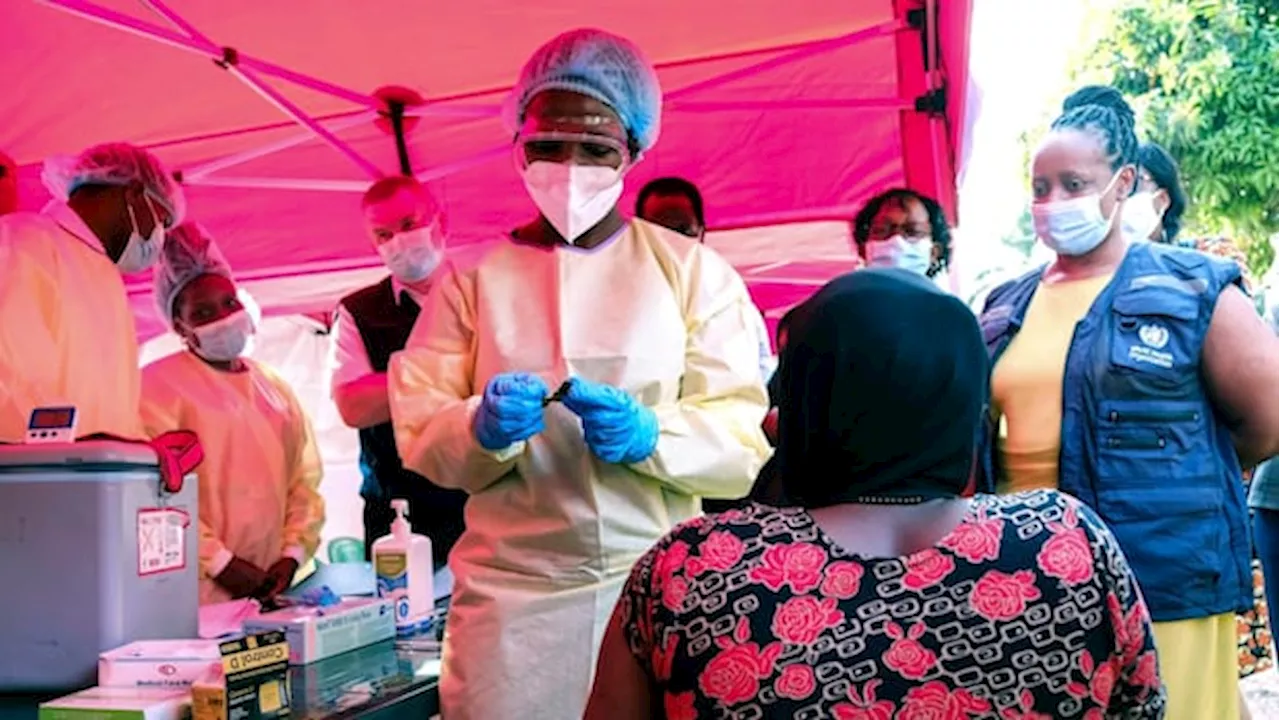A new study suggests a connection between colonial land use practices and the rise of Ebola outbreaks. Professor Christian Lange's research highlights the impact of human encroachment on bat habitats, potentially driving the virus's evolution and spread.
A new study conducted at a university in Surrey has uncovered a correlation between colonial activities and the emergence of the Ebola virus. Christian Lange, PhD, a professor in the faculty of science at Kwantlen Polytechnic University (KPU), dedicated the past 15 years to studying viruses, and his latest research sheds light on the virus's origins.
'We possess historical data that pinpoints the probable events responsible for the emergence of Ebola,' Lange stated in a KPU news release on Tuesday, February 4th. 'Previously, the reasons behind this virus leaving the forest remained unclear, but we've managed to trace a colonial initiative that precisely aligns with the time and location where we believe the virus originated.'The World Health Organization characterizes the virus as a rare but potentially life-threatening illness frequently leading to fatal hemorrhagic fever. Named after the Ebola River in the Democratic Republic of the Congo, near one of the first documented outbreaks in 1976 in Yambuku, a second outbreak occurred concurrently in what is now Nzara, South Sudan. There are four types of Ebola virus that cause illness: Zaire ebolavirus, Sudan virus, Taï forest virus, and Bundibugyo virus.Lange's study revealed that the most recent common ancestor of Zaire ebolavirus circulated in the forests of what is now northwestern Democratic Republic of the Congo in 1960, while the most recent common ancestor of Sudan ebolavirus was prevalent in the southern Sudanese savanna in 1958. The study notes that both regions underwent significant anthropogenic fragmentation between 1940 and 1960, linked to specific colonial schemes promoting cash crop agriculture. The Belgian Congo government orchestrated this fragmentation in the DRC, and the South Sudanese government under British rule did the same. 'In the DRC, it wasn't necessarily a transformation from forest to farmland that disrupted things — it's more subtle. Even if you build one narrow road, you can displace species in the area that may avoid this new barrier. If we examine the data, it's these subtle changes that actually have the more significant effects,' Lange explains. The study found that this impact on the land could be connected to the divergence and dispersal of new Ebola variants across the continent. 'People should consider the impact of land use. Any interference with pristine habitats — no matter how small — has an effect, and in some cases will cause zoonotic events with unpredictable outcomes,' he emphasizes. An Ebola epidemic from 2014 to 2016 resulted in approximately 28,000 suspected cases and over 11,000 deaths. 'Overall, the trend indicates that we're seeing more Ebola than before,' Lange acknowledges. 'The first Ebola cases were in 1976, but there were relatively few until around 2000. Now, there are outbreaks almost every year, mostly in the DRC.' Many human pathogenic viruses are transmitted from animals to humans, known as zoonotic, and many viruses originate from bats. 'Bats are incredibly diverse. They are the second-largest group of mammals. In Canada, there are less than 20 bat species. In Africa, there are hundreds. There are probably multiple species of bats that harbor their own Ebola viruses. At some point, humans came into contact with these bats,' Lange explains.Bats have been forced to migrate and interact with other bat species due to human disruption of their habitats. 'Whenever a virus is exposed to new conditions or transmitted to a new species, it evolves and adapts,' he points out. If current deforestation and fragmentation rates persist, Lange warns that we can anticipate a continuation of the zoonotic event trend. He emphasizes the need for increased education resources and scientific research in developing nations. 'The Congo has some outstanding scientists, but they lack sufficient resources for research. To develop a vaccine or prevent spillovers, we need to understand what we're dealing with. Otherwise, it will take a significantly longer time to find a solution,' he concludes.
Ebola Virus Colonialism Zoonotic Diseases Land Use Virus Evolution
Canada Latest News, Canada Headlines
Similar News:You can also read news stories similar to this one that we have collected from other news sources.
 Missing Sisters' Phone Last Activity Linked to River Bridge, Search ContinuesTwo sisters, Eliza and Henrietta, disappeared from their Aberdeen flat on January 7th. CCTV footage shows them visiting Victoria Bridge on the River Dee the day before. Their phones went dark at 2:12 am, and they left a message canceling their tenancy agreement. Police are investigating whether they entered the river, but there's no evidence of criminal involvement. Search efforts are ongoing despite challenging conditions.
Missing Sisters' Phone Last Activity Linked to River Bridge, Search ContinuesTwo sisters, Eliza and Henrietta, disappeared from their Aberdeen flat on January 7th. CCTV footage shows them visiting Victoria Bridge on the River Dee the day before. Their phones went dark at 2:12 am, and they left a message canceling their tenancy agreement. Police are investigating whether they entered the river, but there's no evidence of criminal involvement. Search efforts are ongoing despite challenging conditions.
Read more »
 Land Protector Takes on Colonial Court SystemDocumentary Warrior Spirit chronicles the life and activism of Will George, a First Nations leader facing legal repercussions for defending his ancestral lands from pipeline expansion.
Land Protector Takes on Colonial Court SystemDocumentary Warrior Spirit chronicles the life and activism of Will George, a First Nations leader facing legal repercussions for defending his ancestral lands from pipeline expansion.
Read more »
 The World Cup as Colonial RevengeThe article explores the deeper meaning behind the World Cup for citizens and descendants of formerly colonized countries, arguing that victories against former colonizers can feel like a form of sweet revenge. It uses the examples of Tunisia's win against France and Morocco's victory over Spain to illustrate this point, highlighting the historical tensions and migrant issues that fuel these emotions.
The World Cup as Colonial RevengeThe article explores the deeper meaning behind the World Cup for citizens and descendants of formerly colonized countries, arguing that victories against former colonizers can feel like a form of sweet revenge. It uses the examples of Tunisia's win against France and Morocco's victory over Spain to illustrate this point, highlighting the historical tensions and migrant issues that fuel these emotions.
Read more »
 Bitcoin Network Activity Dips, Signaling Market ShiftBitcoin's network activity has decreased significantly, with key metrics indicating a decline in on-chain transactions. The Bitcoin Network Activity Index has dropped to its lowest level since February 2024, raising concerns about reduced participation and market dynamics. Mempool data also confirms this slowdown, with pending transactions plummeting to historically low levels.
Bitcoin Network Activity Dips, Signaling Market ShiftBitcoin's network activity has decreased significantly, with key metrics indicating a decline in on-chain transactions. The Bitcoin Network Activity Index has dropped to its lowest level since February 2024, raising concerns about reduced participation and market dynamics. Mempool data also confirms this slowdown, with pending transactions plummeting to historically low levels.
Read more »
 Uganda Launches Vaccine Trial Against Sudan Strain of Ebola as Death Toll RisesUgandan authorities have initiated a clinical trial of a vaccine targeting the Sudan strain of Ebola, which has claimed the life of a nurse in Kampala. The outbreak has also resulted in two additional cases within the deceased nurse's family, prompting a rapid response from health officials and international organizations like the World Health Organization.
Uganda Launches Vaccine Trial Against Sudan Strain of Ebola as Death Toll RisesUgandan authorities have initiated a clinical trial of a vaccine targeting the Sudan strain of Ebola, which has claimed the life of a nurse in Kampala. The outbreak has also resulted in two additional cases within the deceased nurse's family, prompting a rapid response from health officials and international organizations like the World Health Organization.
Read more »
 Super Bowl LIX Expected to Fuel Sports Betting Activity in OntarioA new survey reveals that a majority of Ontarians plan to watch Super Bowl LIX and many will place bets, raising concerns about potential problem gambling. The Responsible Gambling Council highlights the risks associated with sports betting and emphasizes the importance of responsible gambling practices.
Super Bowl LIX Expected to Fuel Sports Betting Activity in OntarioA new survey reveals that a majority of Ontarians plan to watch Super Bowl LIX and many will place bets, raising concerns about potential problem gambling. The Responsible Gambling Council highlights the risks associated with sports betting and emphasizes the importance of responsible gambling practices.
Read more »
